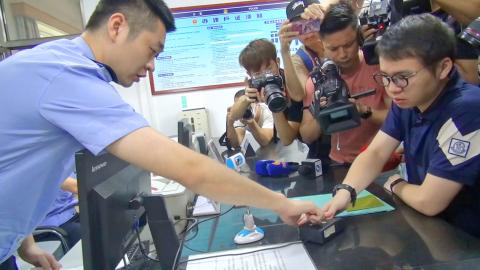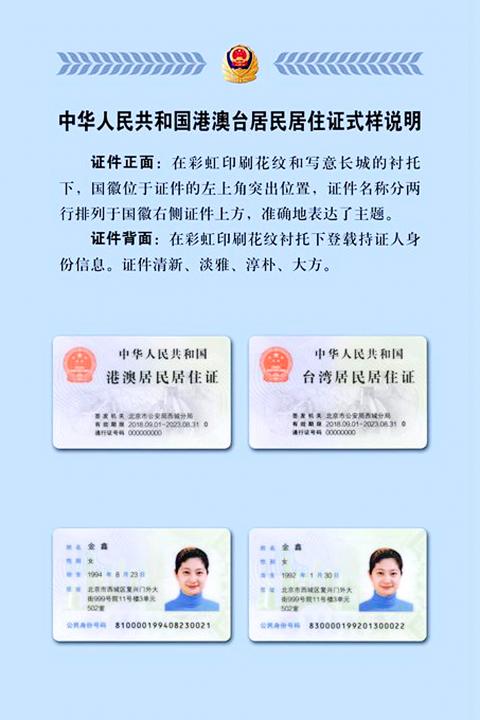Beijing’s issuing of residency permit cards for people from Taiwan, Hong Kong and Macau, which came into effect yesterday, is part of a ploy to bring Taiwan into China’s political fold, the Mainland Affairs Council said.
The cards, which carry an 18-digit code, look almost identical to Chinese identification cards and are aimed at belittling Taiwan’s sovereignty, the council said.
While Beijing has claimed that the new cards will provide Taiwanese residents in China with better access to public services, the council said that it is part of Beijing’s “united front” strategy, and would only benefit China’s agenda.

Photo: CNA
China is being irresponsible, because it has ignored public concerns over the risks card applicants might face, the council said, calling on Beijing to withdraw its “political ploy” and instead contribute to peaceful development across the Taiwan Strait.
The council has warned Taiwanese against risks to personal privacy, particularly in light of Beijing’s efforts to create a vast network of surveillance cameras and facial recognition systems as a means of social control.
The council said that it will try to find out more about the differences between the new cards, and the temporary residence cards issued to Taiwanese working and living in China.

Photo: CNA
Electronic terminals at railway stations, airports, banks and other places will be able to read the cards, making life easier for cardholders who are studying and working in China, the Chinese State Council has said.
Taiwanese do not need to have household registration in China to apply for the new card, but should have resided in China for more than six months, and must have a stable job and a place of residence.
Taiwan Democracy Watch yesterday in a statement said that by differentiating between household registrations and places of residence, Beijing is attempting to circumvent Article 9-1 of the Act Governing Relations Between the People of the Taiwan Area and the Mainland Area (臺灣地區與大陸地區人民關係條例 ), which stipulates: “The people of the Taiwan Area may not have household registrations in the Mainland Area or hold passports issued by the Mainland Area.”
Beijing would gradually force international organizations, and foreign governments and businesses to require Taiwanese to present the new cards on different occasions, forcing Taiwanese to call themselves People’s Republic of China citizens, and thereby claim jurisdiction over Taiwanese, the group said.
The government should restrict or revoke the civic rights of those who apply for the new cards, treat them as dual citizens or enact a separate law to regulate their status, it added.

Conflict with Taiwan could leave China with “massive economic disruption, catastrophic military losses, significant social unrest, and devastating sanctions,” a US think tank said in a report released on Monday. The German Marshall Fund released a report titled If China Attacks Taiwan: The Consequences for China of “Minor Conflict” and “Major War” Scenarios. The report details the “massive” economic, military, social and international costs to China in the event of a minor conflict or major war with Taiwan, estimating that the Chinese People’s Liberation Army (PLA) could sustain losses of more than half of its active-duty ground forces, including 100,000 troops. Understanding Chinese

The Ministry of Foreign Affairs (MOFA) yesterday said it is closely monitoring developments in Venezuela, and would continue to cooperate with democratic allies and work together for regional and global security, stability, and prosperity. The remarks came after the US on Saturday launched a series of airstrikes in Venezuela and kidnapped Venezuelan President Nicolas Maduro, who was later flown to New York along with his wife. The pair face US charges related to drug trafficking and alleged cooperation with gangs designated as terrorist organizations. Maduro has denied the allegations. The ministry said that it is closely monitoring the political and economic situation

UNRELENTING: China attempted cyberattacks on Taiwan’s critical infrastructure 2.63 million times per day last year, up from 1.23 million in 2023, the NSB said China’s cyberarmy has long engaged in cyberattacks against Taiwan’s critical infrastructure, employing diverse and evolving tactics, the National Security Bureau (NSB) said yesterday, adding that cyberattacks on critical energy infrastructure last year increased 10-fold compared with the previous year. The NSB yesterday released a report titled Analysis on China’s Cyber Threats to Taiwan’s Critical Infrastructure in 2025, outlining the number of cyberattacks, major tactics and hacker groups. Taiwan’s national intelligence community identified a large number of cybersecurity incidents last year, the bureau said in a statement. China’s cyberarmy last year launched an average of 2.63 million intrusion attempts per day targeting Taiwan’s critical

‘SLICING METHOD’: In the event of a blockade, the China Coast Guard would intercept Taiwanese ships while its navy would seek to deter foreign intervention China’s military drills around Taiwan this week signaled potential strategies to cut the nation off from energy supplies and foreign military assistance, a US think tank report said. The Chinese People’s Liberation Army (PLA) conducted what it called “Justice Mission 2025” exercises from Monday to Tuesday in five maritime zones and airspace around Taiwan, calling them a warning to “Taiwanese independence” forces. In a report released on Wednesday, the Institute for the Study of War said the exercises effectively simulated blocking shipping routes to major port cities, including Kaohsiung, Keelung and Hualien. Taiwan would be highly vulnerable under such a blockade, because it